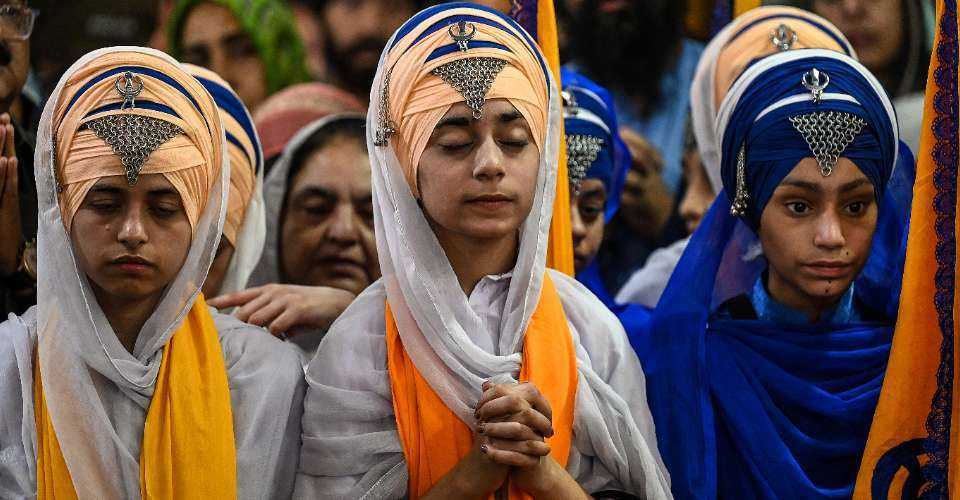
Sikh pilgrims pray in Pakistan’s Gurdwara Panja Sahib on April 14, 2023. Pakistan does not have an institution with legal powers to ensure the rights of religious minorities. (Photo AFP)
Human rights activists have blamed the government and bureaucracy for Pakistan’s failure to set up an effective commission for minorities in the Muslim-majority country.
No government in Pakistan has been serious in constituting a National Commission for Minorities Rights (NCMR) despite an apex court order to do so, said Yasar Talib, a project coordinator with the Centre for Social Justice (CSJ), a minority rights organization based in Punjab province.
He was speaking during a March 21 webinar titled “National Commission for Minorities’s Rights NCMR: Minorities’ Concerns and Interventions.”
It was held to discuss the need for an effective commission after a National Commission for Minorities completed a three-year term in May 2023 having achieved very little, according to organizers.
“This commission had been a continuous failure and a source of embarrassment. Some of the decision-makers involved have made the situation [for minorities] difficult,” he told the webinar.
“The main hurdle is from the bureaucracy which didn’t want to empower the commission to investigate ministries to make them answerable,” he said.
Pakistan does not have an institution with legal powers to ensure the rights of religious minorities, which forced the Ministry for Religious Affairs to form a series of ad-hoc panels since 1990.
In 2014, the Supreme Court asked the government to establish an independent mechanism to protect the rights of minorities like Christians, Hindus and Sikhs. The top court order came following a hike in violence against them. The latest was formed in 2020.
Jaipal Chhabria, who represented Hindus on the now defunct minorities commission, expressed frustration at its closure.
“It was unjustified,” Chhabria said.
Those who avoid making bold decisions were picked up; and neither the state nor political parties had any interest in empowering the commission, he said.
We want a commission established by an act of parliament like other national human rights institutions, Chhabria demanded.
Pakistan’s minorities have been facing discrimination and violence since the nation was formed in 1947.
Although the founding leaders promised equality, Islamic laws prevailed. By 1971, Pakistan was declared an Islamic nation.
Minorities have been facing incidents of violence, including the kidnapping and rape of Christian women and suicide attacks on churches. Minorities are falsely accused of blasphemy and arrested. There have also been cases of mob lynching of blasphemy accused and mobs targeting Christian settlements over blasphemy allegations.
According to the CSJ’s annual factsheet, 193 attacks on persons, properties, and places of worship of minorities were reported in 2023.
“The MoRA [Ministry of Religious Affairs] funded a toothless and sham commission” to treat it like a religious body. The commission would have performed better had it been brought under the Ministry of Human Rights, observed Talib.
Human rights experts at a meeting organized by CSJ on March 12 formed a working group to draft an NCMR bill in conformity with UN Paris Principles and the Supreme Court directives.
However, the Human Rights Ministry showed no interest in participating in the working group,
Christians are planning a social media campaign to seek support among lawmakers in state assemblies and the bicameral parliament.
